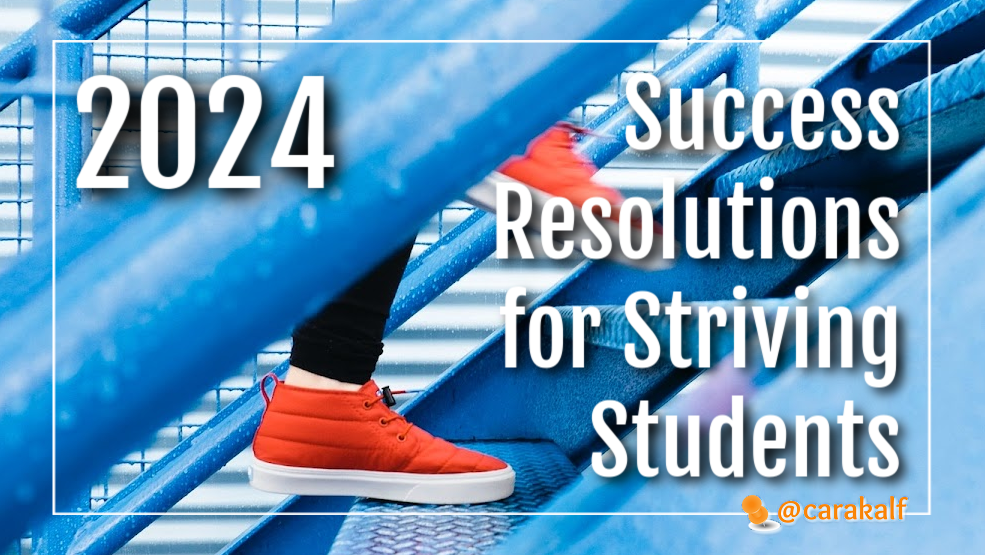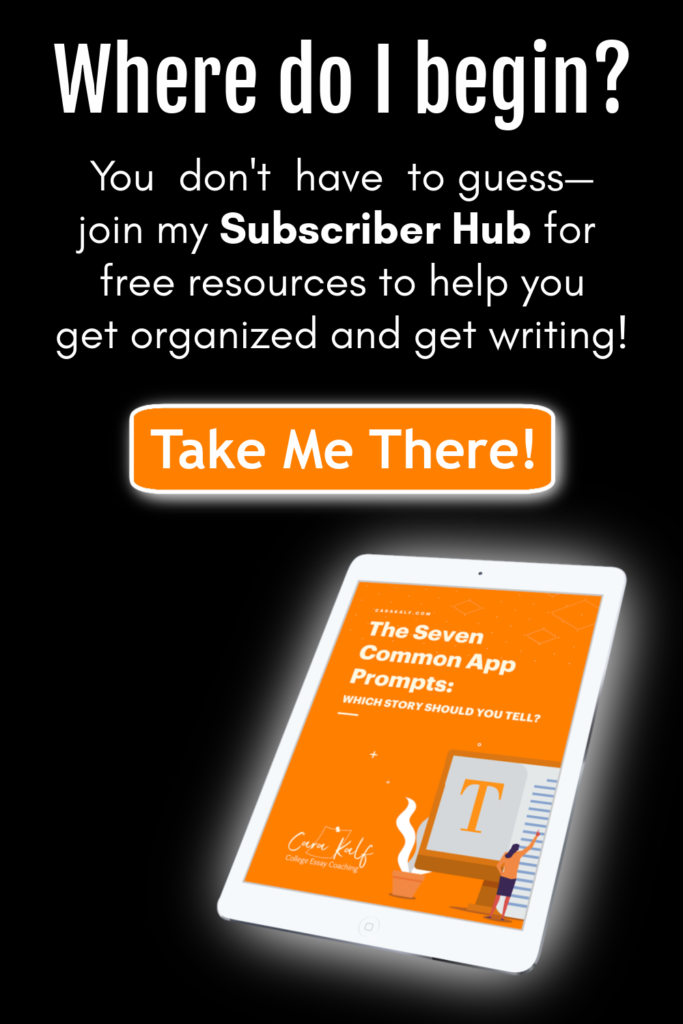Are you ready for a fresh start? In two days, you’ll wake to a pile of 366 brand-new days. Of course you didn’t have to wait for the new year to make changes in your life, but now that it’s at your doorstep, perhaps you want to consider ways that you can make 2024 better than 2023—and more importantly, how you can make 2024 YOU better than 2023 you.
Success Resolutions for Striving Students 2024
My goal for my students—and my readers—is not just to get into college, but to get ready. Whatever got you this far—whether it was talent, skills, systems, or all of those things—may or may not keep you succeeding as school and life get more difficult.
If you’re a candidate—or perhaps even an already-accepted future student!—at one of the country’s top colleges, you likely have some success habits already in place. But the college you are working so hard to get into is going to challenge you even more, and in new ways. Even worse, for some top students, being the best at their high school has led them into bad habits because school hasn’t really been difficult so far. When “big fish” leap from their “small ponds,” they can be in for a rude awakening. The effort level that got them into their first-choice school is not enough to sustain them through it (#freshmanyearroommatestories).
A top-tier college will challenge you. So whether you’re still working on creating a high-school transcript worth bragging about, or you’re a senior looking toward a new beginning in the fall, now is a great time to push yourself to develop habits that will lead to even more success.
1) Track To-Dos
One of the first leaks I find in the success systems of even top students is their To-Do tracking. Whether it’s because they really do have a stellar memory or because life hasn’t yet been challenging enough, I find many students skate by without a reliable method of keeping on top of their To-Dos. At some point, “just remembering” is going to fail you. So start now with developing a plan you can stick to.
If you’re a visual person, check out my Trello boards (free for the taking). If digital is not right for you, get yourself a bullet journal, a Franklin-Covey planner, or any of the dozens of thoughtfully put-together journal/planner combos on the market. If you already use a tablet, get a planner designed for Goodnotes or a similar app, and know that you’ll never forget your planner at home.
Whether you use a paper calendar or not, consider putting a digital calendar like Google on your phone—again, so it will be with you wherever you go. You can break your life up into different calendars (one for family, one for friends, one for work), and you can choose to share your calendars with relevant people (like your carpools).
2) Write More
I may have mentioned this once or twice, but writing is a critical skill for success in high school, college and career. It helps you hone your thinking, prepares you to be a more articulate speaker, and (obviously) it helps you communicate longer and more complex ideas in writing. Most students only write when they are being graded on it, which is like only playing soccer once each week, on game day. Find a way that you can be happy to add writing to your life, and improve your clarity and structure just through doing the work again and again. Consider writing letters or emails to relatives or faraway friends. Consider starting a blog about a topic that interests you. Consider caring for your mental health and your writing muscles at the same time and keeping a journal. Remember that when you’re writing in a journal, you are practicing because you can’t help but practice—you’re not being self-conscious or critical about what or how you’re writing, you’re focused on the ideas you’re writing down. The longer you keep the journal, the more smooth your writing will become, just like the more laps you take around the track the faster your laps eventually become.
3) Talk to your Teachers
When I went to college, my older sister taught me to take advantage of Office Hours, the times that professors make available for student questions. I found that showing up at Office Hours before an exam might give me a particularly clear idea of what was going to be on the exam; that showing up anytime let the person grading me know who I was and that I cared, even in a very large lecture class; and that anything I was struggling with, in general, my professors wanted to help me understand. Being unafraid to accept the Office Hours invitation made a real difference.
High-school classes are generally much smaller and teachers much more approachable—so I’m often surprised how many times I have to specifically encourage students to take advantage of their availability. Most teachers stay after school at least one day a week, and many would be willing to talk to you at other times if you needed and made an appointment. The important thing is to have specific information or assistance you’re seeking. If you have an English paper due, don’t make an appointment to ask your teacher what to write about. DO make an appointment and then create your best effort at a thesis on your own—then you can ask your teacher if you’ve got the right idea. Teachers want to see you succeed, but they need to guide your thinking, not do your thinking for you. Check in with your history teacher to make sure your bibliography is formatted correctly, your science teacher to make sure you’re drawing the right conclusions on the lab. As long as you are doing the work and then asking for feedback, you’re almost certain to get positive results.
4) Clean Out Your Desk or Bookcase
Author Gretchen Rubin wrote, “For most people, outer order contributes to a sense of inner calm, energy, and self-command.” In her book Better than Before, she tells the story of a friend who said, “I finally cleaned out my fridge, and now I know I can switch careers.” Take advantage of that empowering feeling and do some New Year organizing.
The fact is, you’re moving out soon. Now is a smart time to start decluttering the bedroom that you’re going to be leaving behind. That doesn’t mean you have to throw out or donate everything—but ask yourself how long you intend to keep all of those books or the mementos on your shelf. You might bring a whole stack of comfort books with you to your freshman dorm if you don’t have to ship them (#freshmanyearroommatestories), but getting some order in your room will help you be more successful at staying organized with other things, and will make you a more appreciated roommate next year.
5) Learn to Do Laundry
On that note, now is probably a good time to tackle any “adulting” that you haven’t gotten around to. If you don’t yet do your own laundry, that could be a simple resolution to get you thinking and excited about #dormlife. Pro Tip: Add Laundry to your To-Do system if it’s a new responsibility for you. You don’t want to go to your dresser, expecting the magic drawer to have filled itself, and only then remember … you are the Laundry Fairy now.
6) Sleep More
High-flying high schoolers often put sleep last on their To-Do list. You can only keep that up so long. Try out a resolution to get even 15 more minutes of sleep every night—that’s an extra seven hours of sleep this month alone!
7) Tackle Procrastination
Many successful high-school students are already champion procrastinators. I managed not to develop that habit in high school, but by the end of college it was creeping up on me. I discovered quickly that it was a self-reinforcing habit. The more I did it—the more I kept doing it. If putting something off for two days worked—why not three? This is obviously a pattern that’s going to end with disaster if you let it.
If you’re already procrastinating badly as high school comes to an end, you should seriously consider a recalibration before college. Start new assignments immediately. That doesn’t mean they have to be finished immediately. But if you get in the habit of at least beginning, you’ll discover any questions about an assignment before it’s too late to ask for clarification. You’ll find out if you need a particular resource before it’s too late for you to get it. You’ll learn that the film you thought you were responding to is actually a miniseries, and you’ll still have time to watch the whole thing. If you give yourself a fresh start before college, you won’t find yourself pulling an all-nighter to finish a paper the night before it’s due … and still not starting until the next morning (#freshmanyearroommatestories).
8) Give Up Caffeine
On a similar vein, you might try giving up caffeine for some period of time to have a similar reset in your body’s expectations. Consider one month, three months, six months, or all the way until you start college in the fall! If you already need copious amounts of caffeine to wake up in the morning or to get through the day, it’s a lot less effective on particularly early mornings or particularly long days. On the other hand, if you never have it, you can grab yourself a Sprite and still think you’re more awake after drinking it (#freshmanyearroommatestories).
9) Learn to Cook (or at least Eat)
If you’re moving to an apartment in the fall, now would be a great time to learn skills like meal planning, grocery shopping, and making your favorite dishes. If you’re planning to live in a dorm, you won’t need to cook just yet, but you won’t have an adult planning what you actually eat. If your Biology or Health classes didn’t cover nutrition, consider setting yourself some health-based resolutions around eating for optimum energy and brain function so you are prepared to take good care of yourself when it’s just you, the salad bar, the cereal bar, and the ice cream sundae bar.
Join my Subscriber Hub, where I offer free resources for both students and parents. Check out my easy-to-copy organizing systems for everyday
10) Read great books
School is supposed to be assigning lots of high-quality literature to make you Smart. But if the books you’re reading in school aren’t interesting to you or just aren’t enough, you need to be pushing yourself. Reading more books, and more challenging books, hones your skills in understanding and also fills your mental catalog of useful background information. The more connections your brain makes among varied pieces of information, the more mental frameworks you have for remembering new ideas. People also tend to remember stories more than just facts—so reading historical fiction might help you remember true details of history more than just flashcards with dates.
Read more: What’s standing between you and a stand-out essay?
This resolution is a really important one—which is why my first blog post every year is my annual Reading Round-Up. Check back on January 15 for What Are You Reading 2024?


